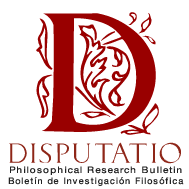Roger Scruton
University of Oxford, UK | rogerscruton@mac.com
Received: 16-September-2018 | Accepted: 22-December-2018 | Published: 31-December-2018
Disputatio [Dec. 2018], Vol. 7, No. 8, a013 | DOI: 10.5281/zenodo.2552958
Article | [EN] | Full Text | Statistics | Copyright Notice [es] | Vol. 7 No. 8
How to cite this article:
Scruton, Roger (2018). «German Idealism and the philosophy of music». Disputatio. Philosophical Research Bulletin 7, no. 8: a013.
Abstract | German Idealism began with Leibniz and lasted until Schopenhauer, with a few central European after-shocks in the work of Husserl and his followers. That great epoch in German philosophy coincided with a great epoch in German music. It is scarcely surprising, therefore, that Idealist philosophers should have paid special attention to this art form. Looking back on it, is there anything of this prolonged encounter between music and philosophy that we can consider to be a real advance, and one that we should draw on? Many have thought so, not least because Idealism, as it matured in the post-Kantian period, inherited the adulation for art in general, and music in particular, that we find in the writings of the German Romantics, notably in Schiller, Tieck and Wackenroder. The post-Kantian Idealists connected aesthetic experience with their claims to reveal the secret meaning of things, in the infinite, the absolute, the transcendental, the ineffable or some other such object of a quasi-religious devotion. Such we find in the writings of Schelling, Fichte, Hegel and Schopenhauer, the last of whom made music not only an object of philosophy, but a prime example of it. Music, Schopenhauer wrote, is not unconscious arithmetic, as Leibniz had claimed, but unconscious philosophy, since in music the inner essence of the world, which is will, is made directly present to the intellect.
Keywords | German Idealism · Aesthetics · Romantics · Post-Kantian · Will.
![]()
El idealismo alemán y la filosofía de la música
Resumen | El idealismo alemán empezó con Leibniz y duró hasta Schopenhauer, con unas cuantas réplicas sísmicas en Europa central en la obra de Husserl y sus seguidores. La gran época en la filosofía alemana coincidió con una gran época en la música alemana. No es muy sorprendente, entonces, que los filósofos idealistas hayan puesto atención especial en esta forma de arte. En retrospectiva ¿hay en este encuentro prolongado entre la música y la filosofía algo que podríamos considerar como avance real y del cual podríamos sacar provecho? Hay muchos que así lo pensaron, no por último, porque el idealismo, conforme maduró en el período posterior a Kant, heredó la adulación del arte en general y de la música en particular, que encontramos en los escritos de los románticos alemanes, en particular en Schiller, Tieck y Wackenroder. Los idealistas post-kantianos conectaron la experiencia estética con su reclamo de revelar el significado secreto de las cosas, en el infinito, lo absoluto, lo transcendental, lo inefable o algún otro objeto similar de una devoción casi religiosa. Algo así encontramos en los escritos de Schelling, Fichte, Hegel y Schopenhauer, éste último convirtiendo la música no sólo en un objeto de la filosofía, sino en el ejemplo principal de la misma. La música no es, escribió Schopenhauer, aritmética inconsciente, según había afirmado Leibniz, sin filosofía inconsciente, puesto que en la música se hace presente directamente para el intelecto la esencia interna del mundo, que es la voluntad.
Palabras Clave | Idealismo alemán · Estética · Románticos · Poskantiano · Voluntad.
References
Valberg, Jerry J. (2007). Dream, Death and the Self. Princeton: Princeton University Press.
Scruton, Roger (2012). The Face of God. London. Continuum.
Scruton, Roger (2014). The Soul of the World. Princeton: Princeton University Press.
Hegel, George W. F. (1975). Aesthetics: Lectures on Fine Art, tr Knox. Oxford: Clarendon Press, vol. 2.
Dalhaus, Carl (1989). The Idea of Absolute Music, tr. Roger Lustig. Chicago: University of Chicago Press.
Eisler, Hanns (1973). ‘Musik und Politik’, in Schriften 1924 – 1948. Leipzig.
Levinas, Emanuel (2003). Humanism of the Other, tr. Nidra Poller. Chicago: University of Illinois Press.
Schelling, Friedrich W. J. (1802/3). Schriften zur Philosophie der Kunst und zur Freiheitslehre. Leipzig, F. Eckardt
Schopenhauer, Arthur (1958). The World as Will and Representation, tr. E.J.F. Payne. Colorado: Indian Hills.
Wittgenstein, Ludwig (1953). Philosophical Investigations. London: Macmillan Publishing Company.
Scruton, Roger (1997). The Aesthetics of Music. Oxford: Clarendon Press.
© The author(s) 2018. This work, published by Disputatio [www.disputatio.eu], is an Open Access article distributed under the terms of the Creative Commons License [BY–NC–ND]. The copy, distribution and public communication of this work will be according to the copyright notice. For inquiries and permissions, please email: boletin@disputatio.eu.

